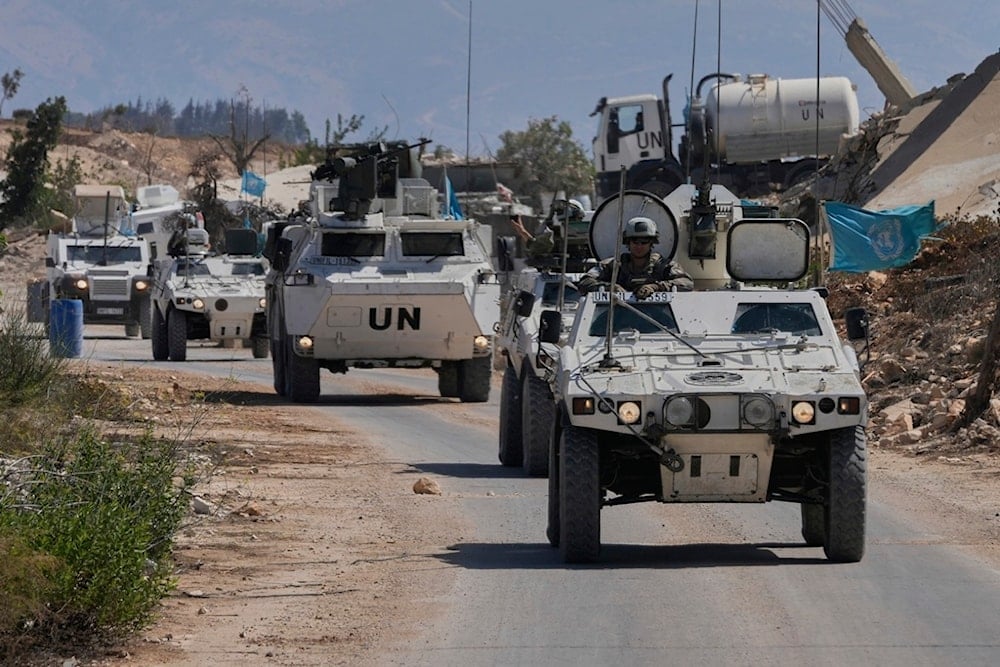Israeli 'border wall' crosses into Lebanon, violates Blue Line: UNIFIL
UNIFIL confirms Israeli wall construction intruding into Lebanese territory near Yaroun, calling it a violation of Resolution 1701 and sovereignty.
-

French UN peacekeepers patrol the Lebanese-Israeli border in the village of Houla, southern Lebanon, Wednesday, August 20, 2025 (AP)
UN peacekeepers have confirmed new violations by the Israeli occupation along the Lebanese border, where concrete barriers have been built across the UN-demarcated Blue Line, restricting access to Lebanese land and threatening to further escalate tensions.
According to a UNIFIL assessment conducted in October, a geospatial survey revealed that a concrete T-wall erected by Israeli forces southwest of Yaroun extended beyond the Blue Line, cutting off more than 4,000 square meters of Lebanese territory. Peacekeepers said they informed the Israeli occupation forces of the breach and formally requested the wall’s removal.
However, construction continued. In November, UNIFIL personnel documented additional T-wall expansion near Yaroun, again confirming through survey work that a section of the barrier southeast of the village crossed into Lebanon. The UN mission said it will also notify the occupation in writing regarding this second violation.
A separate wall under construction between Aytaroun and Maroun ar-Ras was noted to be situated south of the Blue Line, indicating multiple, ongoing alterations to the border area.
UNIFIL described the Israeli presence and wall-building inside Lebanese territory as clear violations of UN Security Council Resolution 1701, which ended the 2006 war and mandates respect for Lebanese sovereignty and territorial integrity. The peacekeeping force reiterated its call on the Israeli occupation to fully adhere to the Blue Line and withdraw from all areas north of it, underscoring the urgent need to prevent renewed escalation along the sensitive frontier.
Israeli strikes damage sections of Litani River
The Litani River Authority said on Thursday that Israeli air force strikes along the banks of the Litani River caused structural damage to parts of the riverbed near the town of Tayr Felsay, leading to partial blockage in several areas.
According to the authority’s statement, "As a result of Israeli aggression targeting the banks of the Litani River in the vicinity of the town of Tayr Felsay, accompanied by a series of air strikes, damage to certain sections was recorded, leading to partial blockage and obstruction of the riverbed in some places."
Technical teams have begun field inspections across the affected sections to assess the damage, remove debris, and secure the watercourse in order to prevent potential flooding. The authority said the work aims to ensure the safety of residential neighborhoods, tourist zones, and surrounding agricultural land that depend on the river.
The teams are coordinating with security forces, Lebanese Army units, municipalities, and relevant organizations to facilitate access to the damaged areas and accelerate recovery efforts, according to the statement.
The authority confirmed that the strikes did not disrupt water quality or operations at the al-Qasimiyya irrigation project, noting that "The attacks did not affect the water quality in al-Qasimiyya irrigation project, nor did they damage any of its vital facilities, pumping stations, or distribution stations. Irrigation programs continue as usual according to the approved schedules."

 3 Min Read
3 Min Read










